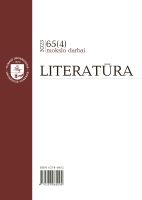L’oralité dans les romans de guerre : les différents aspects des gros mots chez Henri Barbusse et Ahmadou Kourouma
Orality in War Novels: Different Aspects of Swear Words in Henri Barbusse’s and Ahmadou Kourouma’s works
Author(s): Joanna Kotowska-MiziniakSubject(s): Sociolinguistics, French Literature, Theory of Literature, Stylistics, Sociology of Literature
Published by: Vilniaus Universiteto Leidykla
Keywords: orality; war; swear words; Barbusse; Kourouma;
Summary/Abstract: The paper proposes to address, from a comparative perspective, the question of orality in two war novels: Henri Barbusse's autobiographical Le Feu (1916) and Ahmadou Kourouma’s fiction Allah n’est pas obligé (2000). In spite of a temporal distance, a generic framework and a narrative structure that separates the two novels, they both present one major common feature which is the concern to describe the martial experiences – real or imagined – in a direct and personal way, which finds its expression at the lexical level. Although Barbusse’s First World War soldiers do not use the same vocabulary as Kourouma’s child soldiers who took part in the fighting in Liberia and Sierra Leone in the 1990s, their language is characterized by the same abusive use of swear words. Apart from its primary function as an instrument of emotional liberation through an instantaneous cathartic discharge, “soldier’s talk” also plays the role of a communication tool that ensures integration within a community. Leaving aside its linguistic, geographical or historical particularities, the language of combatants from different countries crosses borders and acquires a universal dimension, as the bearer of the collective memory of the tumultuous twentieth century.
Journal: Literatūra
- Issue Year: 65/2023
- Issue No: 4
- Page Range: 8-19
- Page Count: 12
- Language: French

